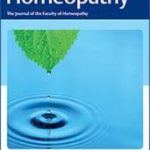Nirupama Mishra, K. Charan Muraleedharan, Akalpita Sriniwas Paranjpe, Devendra Kumar Munta, Hari Singh and Chaturbhuja Nayak
An Exploratory Study on Scientific Investigations in Homeopathy Using Medical Analyzer
JACM, 2011, 17 (8), 705-710

Background: The action of homeopathic medicines, in ultra-high dilution, is not directly observable. An attempt was made to explore autonomic response of selective homeopathic medicines, in healthy persons, using Medical Analyzer System (Electronics Division, Bhabha Atomic Research Centre, Mumbai, India).Objective: The objective of the study was to observe the action of homeopathic medicines on physiologic variability of heart rate and blood flow.Material and methods: Pre- and postinterventional variability spectra of heart rate and blood flow of 77 subjects were recorded with the Medical Analyzer System, administering homeopathic preparations of Aconitum napellus (6c, 10M), Arsenicum album (200c, 1M), Gelsemium sempervirens (200c, 1M), Phosphorus (200c, 1M), Pulsatilla nigricans (200c) and Sulphur (200c, 1M) versus placebo control. The amplitude of the peaks viz. low-frequency, medium-frequency, and high-frequency was measured for postintervention analysis. An increase in the amplitude of any valid peak by 100% or a decrease by 50% was considered as significant change.Results: Aconitum napellus produced a response in heart rate variability (HRV) with 30c potency and in blood flow variability with 1M potency. Sulphur 200c and 1M, Gelsemium 200c and Pulsatilla 200c, produced a 62.5% response in HRV against the placebo response of 16.6%. Gelsemium, Phosphorus, and Sulphur produced a response in blood flow variability with a 1M potency, similar to the response of Aconitum napellus 1M.Conclusions: These data suggest that it is possible to record the response of homeopathic medicines on physiologic parameters of the autonomic nervous system.





